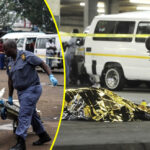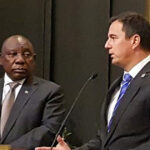The South African National Defence Force (SANDF) has insisted that 14 of its soldiers who recently died in the Democratic Republic of Congo (DRC) did not perish in active combat. This claim, however, has been met with scepticism and criticism from Members of Parliament (MPs), who are calling for clarity and accountability over the deployment.
The soldiers were part of a peacekeeping mission under the Southern African Development Community (SADC) and the United Nations, aimed at bringing stability to the war-torn eastern DRC. Their deaths have sparked a heated debate in Parliament, with MPs across the political spectrum questioning the mission’s purpose and the SANDF’s preparedness.
SANDF chief General Rudzwani Maphwanya addressed Parliament on Tuesday, providing limited details about the repatriation of the fallen soldiers. He dismissed claims that the troops were inadequately prepared for their mission, stating, “They went through combativeness training. They went through mission readiness training, and it was not for lack of training that we suffered casualties.”
Maphwanya also denied that the soldiers were killed in direct combat or targeted by Rwandan forces. “Rwanda responded to their fire. The fire was coming over our base. So you are between the forces that are firing and those that are being fired at, that’s what I meant when I said we found ourselves between the fire of the FARDC – which is the DRC forces – and the Rwandan forces, which is RDF,” he explained.
He added that most casualties resulted from indirect fire rather than close combat. “Being a soldier, most of our casualties did not come from close combat. [They] came from indirect fire from various shootings. We increased our intelligence collection, we fortified our bunkers, and we knew that this was the nature of the fight we were having. We train even more as we fight,” Maphwanya said.
However, his explanation did little to satisfy MPs, who questioned why a white flag was raised at a South African base. Maphwanya clarified that it was not a sign of surrender but an appeal for warring parties to cease fire.
The SANDF Chief’s claims contradict his department's earlier statement, which confirmed that the soldiers were killed during a pitched battle with M23 rebels. The rebels had launched a full-scale attack aimed at capturing Goma, a strategic city in the eastern DRC.
Defence Minister Angie Motshekga reiterated that the SANDF’s mission in the DRC was strictly peacekeeping, not war. “You don’t take your firepower to a country if you are not going to war. We went there for peacekeeping, not for war. We took enough firepower to protect ourselves. We won’t take all our massive firepower to the DRC because we are not there for war,” she told MPs.
Motshekga emphasised the importance of diplomacy in resolving the conflict. “We have more than 10 countries there, and we are not playing big brother in the DRC. We believe that you can’t solve any conflict with just the gun. The solution is going to come from negotiations. It’s not going to get better with a war. Diplomacy is the only thing that will work,” she said.
Despite her assurances, MPs expressed deep concern over the SANDF’s lack of resources and support. Economic Freedom Fighters (EFF) MP Nazier Paulsen criticised the SANDF leadership for deploying troops without adequate equipment.
He added, “We have drones to conduct surveillance and [they are] world-class. So do we provide this to our defence force? Had we sent this equipment, we would have a different situation. We send them to the wolves. This is a war, it is no longer a peacekeeping mission.”
Democratic Alliance (DA) MP Chris Hattingh echoed these concerns, sarcastically remarking that Motshekga was the only one referring to the operation as a peacekeeping mission.
“What did the president order? No air support, very limited logistical and medical support. The lack of resources. Who advised the minister and the president that this is a peacekeeping mission?” Hattingh asked.
He further criticised the SANDF’s capabilities, stating, “We cannot go out there; we are, in fact, hostages. We can’t simply get in there and now we have to thank rebels for water and food. We have to thank them for not retaliating, because we killed so many of their soldiers. We are surrounded.”
African National Congress (ANC) MP Windy Plaatjies questioned the necessity of the SANDF’s presence in the DRC. “Why do we need them to be there? What will politically be needed to ensure there is peace in the DRC?” he asked.
ActionSA MP Athol Trollip raised concerns about the injured soldiers and the status of SANDF bases in the DRC. “We speak of troops going to die, what about evacuating the injured? We are going to have more body bags coming to South Africa. Also, what are the statuses of the bases we have in the eastern DRC? Are our troops prisoners of war?” he asked.
The fallen soldiers, hailed as heroes, included four from Limpopo’s Mopani district: Louis Calvin Moagi, Derick Maluleke, Matome Justice Malesa, and Sabati Chokoe. Their families are now preparing to lay them to rest, but the pain of their loss is compounded by unanswered questions and a lack of clarity from the SANDF.
Derick Maluleke’s sister, Goodness Maluleke, shared her family’s anguish. “I was asking myself anxiously about the wellbeing of my brother the whole week as I was following the developments in DRC. Then last week Friday, some men wearing military regalia arrived with the sad news,” she said.
She described the manner in which the news was delivered as insensitive. “The way they told us about my brother’s passing was like a joke. However, moments later, it sunk in that my brother is no more. They told me that there was a bomb explosion and Derick was among the casualties. Without giving us more details, they left, and no one has ever communicated with us again. We are in mourning and need closure on this matter,” she added.
As the SANDF and government officials continue to defend the mission, the families of the fallen soldiers and the South African public are left demanding answers. The tragic loss of life has highlighted the complexities and dangers of peacekeeping missions in conflict zones, as well as the urgent need for transparency and accountability in how such deployments are managed.











